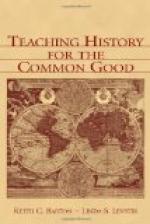There are additional suggestions particularly applicable to the teacher of history.
1. In all the questioning
remember the purposes of the recitation.
Ask
questions knowing exactly what you wish as an answer.
There
is
no time for aimless or idle questioning.
2. Inquire frequently
as to the books used in preparation of the
lesson.
Let no allusion or statement in the text go unexplained.
Let
none of the author’s conclusions or opinions
go
unchallenged.
Ask the student for inconsistencies, inaccuracies,
or
contradictions in the text. Put a premium on their
discovery.
Insist
on the student’s authority for statements other
than
those
given in the text.
3. Do not use the
heavy-typed words frequently found at the head of
the
paragraph or the topical heads furnished by the text,
if it
can
be avoided. The pupil should not be allowed to
remember his
history
by its location in the text.
4. Be sure that
the class have an opportunity to recite on the
questions
assigned for their advance preparation. Nothing
is
more
discouraging to a student than carefully to prepare
the
work
required and then fail of an opportunity either to
recite
upon
or to discuss it.
5. Discover the
tastes, shortcomings, and abilities of your
individual
students and direct your future questions
accordingly.
There will usually be in the class the boy who is
glib
without being accurate. He should be questioned
on definite
facts.
There will be the student whose analysis of events
is
good,
but whose powers of description are poor. Adapt
your
questions
to his special need. There will be the pupil with
the
tendency
to memorize the text verbatim. There will
be the
student
who knows the facts of the lesson, but who fails to
remember
the sequence of events—the kind who never
can tell
whether
the Exclusion Bill came before or after the Restoration.
There
will be the usual amount of specialized tastes, curiosity,
timidity,
laziness, and rattle-brained thinking. The questioning
should
probe these peculiarities, and stimulate the pupil’s
ambition
to improve his preparation at its weakest point.
Needless
to say the questions should not be asked with the daily
idea
of making the pupil fail. Like any other surgical
instrument
the question probe should be used skillfully and with
a
proper motive. It would be as great an error to
bend your
questions
continually away from the student’s special tastes
and
abilities
as to be perpetually guided by them.




